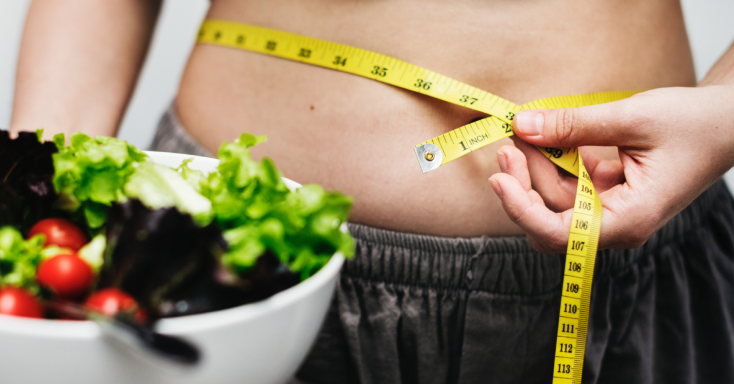This is an embarrassing story, and I am sharing it so that those who suffer from embarrassing and painful belly bloat can get some relief.
I was backstage, at a physique show waiting for my group to be called for judging, and suddenly my belly ballooned out in a painful bulge.
I had prepared for over a year for this competition. Now I was in a panic because I needed to have a flat belly to do well***.
My diet leading up to this was spot on. I was careful to avoid any known bloat causing foods (read on the see what they are) but, the butterflies in my stomach took over, and my system responded to the stress with gas production.
I had no choice but to do the best I could. I calmed myself down, by finding a quiet corner. I closed my eyes put my feet up and went into a deep breathing almost meditative state. Within 15 minutes the bloat had subsided. That quiet experience gave me profound gratitude because I knew I was going to be fine.
Bloating is a frustrating issue, with physical discomfort, and clothes that suddenly don’t fit, and anxiety. We eat clean-ish, and yet we can still experience these painful bloating episodes. Why does this happen, and how can we prevent it?
This is a good time to point out that puffiness or edema is an excess of interstitial fluid* is not the same as bloating. Fluid accumulation is gravity dependent and is primarily seen in the extremities, like hands feet and ankles. Puffiness and bloating are not the same. Bloating in the digestive system is primarily gas.
What causes bloating?
- Inflammation secondary to food intolerances
- Hormone fluctuations
- Dehydration
- Response to stressful situations
Looking back on that day backstage, I was very likely dehydrated, stressed, and had some hormone fluctuations.
Here are some food and non-food behaviors to adapt to minimize painful gas in your belly:
7 foods to avoid to minimize bloating.
- Avoid Excessive starchy carbs. If you don’t know what excess is for you, begin by cutting your starchy carb consumption in half and assessing your bloat status.
- Limit processed foods. Avoid boxed or prepared foods, and opt for simply prepared meals with minimal ingredients.
- Hold the hummus. Legumes including chickpeas and all types of beans may produce volatile gas in sensitive individuals.
- Make broccoli servings small and cooked. Cruciferous veggies like broccoli, kale, cabbage, and cauliflower can cause painful intestinal gas in some of us. First, try to just minimize these veggies to a 1/2 cup serving per day and chew very thoroughly and slowly. Blanching in boing water for 2-3 minutes can help minimize intestinal gas production.
- Ditch the dairy. Exceptions: plain unflavored yogurt with active cultures. (read the label) well aged hard cheese, sheeps’ milk cheese, goats’ milk cheese. Some people cannot even tolerate cultured yogurt and hard cheeses. Make note of your reactions.
- Get rid of your gum habit. Chewing gum causes bloat in two ways. Artificial sweeteners in gum are strong gas producers. (xylitol, erythritol, sorbitol, and sucralose) If you have ever overindulged on sugar-free ice-cream and had a food-belly, you have experienced this. [Food belly = looking like you are pregnant, yet just filled with painful gas and undigested food] Additionally, chewing gum causes significant ingestion of air resulting in gas accumulation.
- Identify food sensitivities A effective way to do this is to eliminate one suspected food for one week and note any changes. Continue eliminating just one food for one week at a time to identify the food villain(s).
Adopt these behaviors:
- Chew thoroughly– Digestion begins in our mouth, and the time food spends in our mouths is important for adequate digestion, and minimal gas production. Chewing more slowly and thoroughly also minimizes air ingestion. This is a very common problem with hurried living!
- Prioritize meal-time as a time to relax, like the leisurely family dinners of years gone by. The majority of our nerve endings are in our gut. It is a proven fact that stress is often expressed in our gut. This is no surprise because the vast majority or our nerve endings reside in our digestive tract. Adding food to a stressed gut or eating while under stress significantly increases the chance of gas production. A relaxing and leisurely mealtime is a prophylactic measure to prevent the production of gas.
- Eat more of these foods:
- Garlic
- Ginger (anti-inflammatory)
- Pineapple (contains an enzyme that breaks down protein and aids in healthy digestion)
- Cucumbers (anti-inflammatory)
- Plain yogurt with active cultures (without any sweeteners artificial or natural) If and only if you are not dairy sensitive.
- Peppermint tea
- Ginger Tea
- Papaya
- Bananas
- Kiwi
- Avocados
- Pistachios
- Parsley
The best practice is to get focused on avoiding gas-producing situations, avoiding stress at meal times and minimize overall stress to put an end to bloating episodes.
*Fluid outside of the cells
FREE Video Series: The Best Exercises for Women Over 40!

Free 3-Part video Series goes in-depth teaching you how to perform the above exercises step-by-step THE RIGHT WAY without getting hurt.


